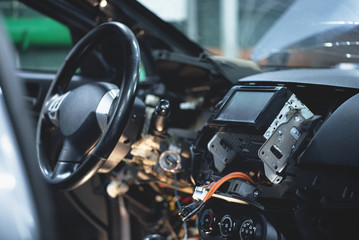Your car’s audio system is a complex and multifaceted piece of technology. That’s why looking professionally at your system is always best when things go wrong. One of the first things that they will do is check your fuses and wiring for issues. If they find any, they can make precise recommendations to fix them.

Car Audio is a complex piece of machinery and requires the skill and expertise of a competent technician to get back on the road in tip-top condition. A mobile mechanic will come to your home or office and conduct voltage testing, inspect for blown fuses, trace wiring, and more to get to the bottom of what is causing your audio system to give you the dreaded hump.
The power supply supplies electricity to all other components in your car’s audio system. Unsurprisingly, the power supply is the most complex component in a modern car audio system. A good power supply should have many features, such as a high current capacity and multiple inputs easily controlled via switches. The most important feature is that it must be able to deliver the right voltage at the correct frequency to ensure that your amplifiers, speakers and other components are not compromised.
Car audio systems are complex and often require a skilled technician to repair them. A mechanic must inspect the wiring to determine what’s going wrong. Wiring connects the radio to the battery and alternator and each speaker located throughout the cabin. It also protects electrical components from power spikes that can “blow” fuses.
A blown fuse is the most common cause of a car radio not turning on. This may happen due to an erroneous wire or a bad connection at the radio or amplifier. A mechanic can test the radio’s power and ground connections and check for blown fuses. If a fuse is blown, it may need to be replaced.
Speakers are the key to car audio, providing your stereo with sound. Over time, speakers can become damaged. Some of these can be fixed at home, but more serious damage will require the help of a professional.
In most cases, blown speakers are caused by either mechanical or thermal failures. They may also be a result of amplifier clipping. A lack of range is the most common sign of a partially blown speaker. Listen for a fuzzy, hissing, or static distortion at medium volume levels. If turning up the volume causes the distortion to worsen, you’ve got a partially blown speaker.
Before replacing the blown speaker, check its impedance using a multimeter. Set the meter to ohms and touch its lead to the speaker terminals. A reading of 1.0 ohms means the speaker is not blown, while an infinite reading indicates it’s blown out.
Amplifiers are the heart of a car audio system. They take the raw signal from the head unit and turn it into a usable, high-quality audio signal. Amps vary in size and power, from tiny mini units that can power a few watts to large, premium factory-installed amplifiers that are capable of filling theaters with sound. But they all have in common that they use transistors to convert electrical signals into a usable form for speakers.
They also use a variety of other circuitry to control output voltages and improve overall performance. For example, amplifiers can have active crossover circuitry, which separates frequencies between different input channels to make each channel operate more efficiently. They can also have thermal protection circuits that shut the amp off if it gets too hot. Overheating can cause a variety of problems, from the protection circuit not shutting off quickly enough to permanent failure.
Speakers are a vital component of a car audio installation. They help reproduce the sounds you hear in your vehicle and can be found anywhere from the front dash to the parcel shelf. The speakers you choose for your system should be able to handle high levels of power. You will often see short bursts of power levels when you play loud music, and if your speaker is not rated to handle such spikes, you can damage it in the long run.
Impedance can also affect how well your speakers can reproduce bass. Ideally, speakers have an impedance of 4 ohms, but you can get better performance by choosing a higher ohm rating. The best speakers for your car will offer a broad range of frequency responses. This will ensure that the sound you hear is clear and accurate. It will also improve your overall audio experience.